So in the midst of random days blurring together, the amount of new releases worth talking about has built up quietly but considerably. And having had a lot of time on my hands recently, I have been listening to a lot of new music as you’ll see below. But I’m sure you can imagine that my mind has been occupied with the kinds of things all of our minds are occupied with recently —- namely, the news: the lockdowns, reopening phases, and as of late, the protests that are still happening all across this country and beyond. So my time management took a bit of a hit in the face of seemingly endless hours to drift around aimlessly, or to go for sanity-preserving drives out and about just to get out of the house. Thankfully, I’m back at work finally, and I’m quite grateful for that, and so here’s some long overdue housekeeping: Many uber-condensed reviews of recent new releases (and one from earlier in the year), all music that’s been on my rotation this past long, long month and a half.
And if you’re wondering whether at the half year mark I’ve noticed any kind of theme or trend to the year’s musical output —- the answer is not really, and maybe that’s because time has been so abstractly dilated lately that I’m just not mentally equipped to perceive that yet. My great hope right now (for more than just music reviewing reasons mind you) is that the next six months are “normal” relative to what we’ve just gone through, and that normalcy will allow me the luxury of thinking about these kind of fun ideas and not worrying about, well everything I’d been worrying about for awhile now. I hope you all are doing as well as you can, don’t be afraid to hit up the comments section below with updates on your lives as well as thoughts about the albums below. Social media is so toxic lately, that we all might be in need of a better refuge to vent and scream into the void.
Sorcerer – Lamenting Of The Innocent:

Finally, Sorcerer’s follow up to the excellent The Crowning Of The Fire King (a Metal Pigeon 2017 Best Album of the Year) is here in Lamenting Of The Innocent. I hoped that they’d carry on with their special mix of gorgeous, transcendent melody and ominous, all-encompassing Candlemass-ian heaviness, and it seems like they’ve decided to not fix that which wasn’t broken. This band has two main draws for me, one is the jaw dropping vocals of Anders Engberg who I first came to notice with his live vocal performance on Therion’s 2001 Wacken Open Air recording, and next the ex-Therion guitarist Kristian Niemann, who might be one of my favorite modern metal guitarists ever. His clear tone and richly melodic, flowing style was a perfect fit in Therion’s epic, expansive compositions and the same goes for his work in Sorcerer. Like Therion, Sorcerer lives and breathes in expansive, cinematic sound worlds, and you hear that on the title track, with its balancing of brutal, punishing guttural moments set against the backdrop of a cosmos-invoking, hypnotically swirling, melodic lead guitar. Niemann is an outright star on this track, his solo mid-way through built on unexpected figures and patterns, yet seamless and smooth. Its a stellar song, this album’s “Unbearable Sorrow” that I so loved from their last record, and its got stiff competition from “Deliverance” where Johan Längquist himself shows up as the guest vocalist. He does an incredible job alongside Engberg, particularly in their enjoined duet past the three minute mark in one of the album’s most emotional moments. Again, despite the beautiful cello accompaniment, somehow Niemann manages to steal the show on the instrumental side of things here, his melodic figures adding honeyed sweetness to the smoky, ghostly doomy balladry. This is a strong album throughout, no real dips or lulls, and Sorcerer is proving themselves to be a band that can transcend genres —- if you don’t normally enjoy doom metal, you’ll be surprised at the variety of tempos here, at the brightness of some of these sounds, and the unabashed bounty of melody that’s spilling over the sides here. Its doom metal put through a trad-metal filter, closer to the spirit of classic Candlemass than any of the newer styles that doom has morphed into over the years.
Paradise Lost – Obsidian:

It’s always interesting to consider what new releases will pop up at seemingly the perfect moment in relation to your life. As despite cooking up an Anti-Anxiety Power Metal playlist to combat all the mental fatigue I and many others are dealing with at the moment —- the truth is sometimes you just need something really dark and angry to work through these negative feelings in the most visceral way possible. Paradise Lost’s newest, the aptly named Obsidian, is a raw, bleak-toned, brutal and angry affair that’s loaded with memorably jagged, cutting riffs and Nick Holmes brooding, deadpanned vocals with plenty of those agonized death growls that punctuated 2014’s The Plague Within and Bloodbath’s recent The Arrow Of Satan Is Drawn. You might recall that I wasn’t too wild on the last PL outing, Medusa, thinking it a bit too meandering and not really digging the reversion to the softer side of the band’s sound. That’s why I was enthusiastically nodding along to the driving, grinding rhythmic riffing that came barreling out the gates with the album opener “Darker Thoughts”, possibly my favorite cut on the album. Guitarist Greg Mackintosh’s darkly sombre, melancholic tone infuses his lead playing, that’s at once dissonant and unsettling yet gorgeous and shimmering at once. Aaron Aedy is crushing on rhythm guitar, sitting in a pocket that’s slightly behind the beat and aloof with its fuzzy tone, yet capable of reaching forward with alacrity whenever the aggression needs to ramp up a notch. The single “Fall From Grace” might be a close second as a favorite however, with its measured pacing and downcast choruses opening up into an unforgettable bridge sequence where Holmes laments “We’re all alone”, which is simultaneously haunting, depressing, and cathartic to hear. There’s a slight nod to the band’s 90s era I’m hearing on songs like “Forsaken”, and a much more noticeable nod to old gothic influences ala Sisters of Mercy on “Ghosts” —- so the band keeps its overriding death infused heaviness tempered to some degree. But that merger is what makes Paradise Lost such an engaging band, as particularly of late they’ve proven that they can reintroduce heaviness into their sound and not lose that dramatic, haunted touch that defined so much of their work in the late 90s and early aughts. This is an excellent album, not quite as gratifyingly crushing as The Plague Within, but few albums are —- its definitely a step up from Medusa to my tastes anyway, and I guess I’m finding out that I prefer my Paradise Lost fix grittier, grimier, and darker than some.
Fellowship – Fellowship (Ep):

Nascent UK power metal upstarts Fellowship are making quite an impression with their debut three song self-titled EP, available on Bandcamp. I know you’re probably wondering why a band would be worth writing about who’s only a mere three song EP into their career, but it’s justified given the truly inspired results they’ve managed in just these short fifteen plus minutes of music. They’re perhaps a bit of an odd duck coming from the UK, as despite the Maiden-ish twin guitar setup, their sound is closer to that twinkly sound of bands such as Sonata Arctica, Highlord, and Twilight Force. But as their vocalist Matthew Corry has intimated himself in comments made on r/PowerMetal, there’s outside influences at work here, particularly in the vocal melodies where you hear his pop-punk roots emerging in the way he manages phrasing, delivery, and lyrical meter. That combination can be heard in the highlight and leadoff track “Glint”, one of the best songs you’ll hear all year. It’s a rare example of a deeply introspective take on self-empowering lyrics in power metal that aren’t too attached to fantasy tropes or lost in the miasma of metaphysical psycho-babble that we sometimes hear in certain bands (*cough*Avantasia). That chorus alone is the kind of spectacular moment that gives me hope for this band’s continued artistic success, because if this is what they’re capable of right out of the gate, the well of inspiration must be deep. Equally excellent is “The Hours Of Wintertime”, where I was blown away by the energy building mid-song bridge sequence (“…and now I’m left here fighting on my own…”) —- these guys are skilled at maximizing the potency of their best melodies and refrains, wisely avoiding the one and done status that I’ve noticed veteran bands sometimes doing when overthinking songwriting. I get a real Power Quest Magic Never Dies era vibe on the mid-tempo keyboard driven “Hearts Upon the Hill”, particularly in the rhythmic strut of its verses (in fact, I hear a lot of PQ in their sound, but it’d be presumptuous to call them an influence). The band recently released a music video for their cover of Elton John’s Disney classic “Can You Feel The Love Tonight?”, and the band makes it their own and thensome, lifting the song from syrupy balladry to an energetic, starry-eyed wonder. It’s a great sign, because truly creative bands know how to re-imagine the songs they cover, not regurgitate them.
Fairyland – Osyrhianta:

Fairyland’s long decade plus wait for a new album has finally come to an end with the release of Osyrhianta, a wildly symphonic album that see’s the band picking up where they left off. I mean of course, the line up is different, but with Fairyland that’s to be expected. I’m not going to go into who’s in the band from last time and who’s not, because it’s an entirely different lineup to Score To A New Beginning, which had an almost entirely different lineup to The Fall Of An Empire… you get the idea. The important touchstones to mention however is the return of former drummer now bassist Willdric Lievin, whose participation seems to have paved the way for the return of Elissa Martin on guest vocals on the wistful semi-ballad “Eleandra” (heh, sorry if I got your hopes up there for a second). On primary vocal duty is current Wind Rose vocalist Francesco Cavalieri (yes from the “Diggy Diggy Hole” band), an interesting choice to be sure, but I gotta admit he oddly fits into Fairyland’s opulent oeuvre quite well, his slightly gruff edged vocals lending a bit of grit and heft to the band’s grand, flourishing melodies. At the still beating heart of Fairyland is keyboardist Philippe Giordana, and his songwriting style is still geared towards regal, heavily orchestral keyboard melodies directing the flow of traffic, with guitar solos complementing things to spectacular effect —- check the :40 second mark of “Across The Snow” for a gorgeous demonstration of this synergy. This is definitely not riff-oriented power metal, with Fairyland staying true to their Rhapsody-ian cinematic roots than leaning towards any of the current crop of modern Italian power metal bands making waves lately. In that sense this sounds like a record out of the early to mid 2000s, albeit with a glossier production job. And back then I wouldn’t have enjoyed this (I became a fan of Fairyland’s stuff only recently actually), wanting a heavier, riffier take on power metal than what the Italians were dishing out at the time, but I’ve grown to appreciate this particular vein of the subgenre, and am enjoying Osyrhianta quite a bit. It’s a little top heavy, with the back quarter of the album sounding somewhat repetitive, but that could be a testament to the quality of those first seven songs being genuinely excellent. A fun blast from the past that sounds thoroughly relevant in the power metal landscape today.
Green Carnation – Leaves Of Yesteryear:

This is yet another one of those long dormant veteran bands springing back to life that’s been so frequent as of late. I’ll confess that this was a name I’ve heard before, likely from my MSRcast cohost Cary, but can’t remember listening to until now when I stumbled upon them a bit ago on Spotify’s new metal releases playlist. Green Carnation are a prog-ish, sometimes metal and sometimes hard rock band from Norway on Season of Mist records, which isn’t surprising given the label’s roster these days but very far removed from its extreme metal roots. Although not entirely far removed I suppose, as this is the longtime, on-going project of ex-Emperor bassist and ex-Carpathian Forest guitarist Tchort, who handles guitar duties here as well. His work here is far removed from his extreme metal work, owing more to the 70s prog-rock guitar rock of Deep Purple and Uli Jon Roth era Scorps. It’s a perfect partner to the slightly hazy, hard rock vocals of Kjetil Nordhus, who sounds a little more relaxed here than he does in his other gig as Tristania’s male co-vocal lead. The aforementioned prog dimensions of the band are most discernibly shown in the winding, often exploratory songwriting modes that take most of these tracks into eight plus minute lengths. Solos are allowed to blossom gradually, often to gorgeous effect as heard in “Leaves of Yesteryear”, and there’s often an uptempo yet unhurried balance going on in these songs that keeps you engaged, never checking out. I think the hard rock foundations of this band really do wonders to that end, because the most visceral and engaging factor that I enjoy about this album is its basic listenability. It’s that I find myself nodding my head along to the riffing, reveling in the awesome lead breaks that abound, and generally just rocking out to the catchiness of songs like the psychedelic soaked “Sentinels”, and the dirty blues-based edge of “Hounds”. This is tremendously satisfying, and a good one to check out if you’re in need of a dose of hard rock this summer.
Katatonia – City Burials:

The Swedish jelly to Opeth’s peanut butter in terms of bands who were once rooted in death metal but meandered out of it into something entirely more… cleaner we’ll say, Katatonia are back with yet another release that likely will frustrate longtime fans. The thing about Katatonia however is that I find their post-death metal experimentation and overall direction far more palatable and engaging than I do Mikael Akerfeldt and company’s recent outings. Katatonia have tended to describe their music not as a particular vein of metal, but as simply dark and heavy —- and even as they’ve continually lightened up the sonic aspect of their sound, those two definable traits have certainly never gone away. I was thrilled with how much I enjoyed 2016’s The Fall of Hearts, and I’m even more ecstatic to say that I might love City Burials a bit more. I think its accurate to say that this is ultimately a rock record with a metallic coating, because these songs are built more on rhythms and guitar figures that more loose, perhaps even spacier at times then your traditional metal based guitar approach. Songs like “Behind The Blood” have sly, slinky vocal hooks, where Jonas Renkse’s smooth but tortured voice eases from verse to chorus and so on with subtle inflections. That leads to eyebrow raising surprises whenever he elevates things with a shout or a yell, as in “Lacquer” when he raises his voice to an unexpectedly high pitch during the bridge sequence. But beyond Renkse’s hypnotic pull as a captivating vocalist, Katatonia works together as a whole —- this is as unified a band record as you might hear all year, all these elements working together towards a singular purpose, with no one really striving to stand out. Guitarists Anders Nyström and still new guy Roger Öjersson are laid back, restrained even, preferring minor flourishes even in lieu of having space for extended guitar solos. That might frustrate some listeners who want more of a livelier approach to things, and make no mistake, this is a laid-back album relative to, well everything else I’m reviewing in this article. This might be a mood based record for many, maybe even for me, as I do find myself listening to it in my grumpier, sadder moments.
Wolfheart – Wolves Of Karelia:

Finland’s most prolific blackened death-doom creator, Tuomas Saukkonen, has returned with the third Wolfheart record in the last three years, an incredible rate of output considering he also released a new Dawn of Solace record earlier this year in January. Wolfheart’s Wolves of Karelia is as full throated and impressive as the previous two, albeit in a more hammer-smash-face kind of way than the progressive metal experimenting of Tyhjyys, or the more emotionally resonant side of their sound displayed on Constellation of the Black Light. This new album is tied together with a lyrical theme (concept even?) focusing on the Winter War, a conflict that pitted Finland against the invading USSR at the dawn of World War II. Being a Finnish band, you can expect Wolfheart to bring perhaps a nationalist flair to its overview of this conflict, and indeed they do, never spelling things outright, but this is as close to Sabaton territory as they can come without loading up the keyboard lines and triumphant choruses. As Saukkonen bellows in “Hail of Steel”, “These lands belong to the north / These are the woods where wolves of Karelia rule”, and that’s kind of the theme we’re running with across these fittingly punishing, and straightforwardly brutal songs about defiance, the deathly cold, and the ravages of war. So on “Horizon On Fire”, the band’s more unrelenting, blistering side comes through, ditto for cuts such as “Born From Fire” and the album highlight “The Hammer”, as aggressive a song the band has ever done. I will admit that I longed for some more moments where we’d hear the Finnish melancholy influenced side of their sound, with the aptly named “Eye of the Storm” providing the only spell here. This imbalance makes Wolves the band’s heaviest album by far, but also prevents it from being among my favorites, as Constellation had more of that light and dark nuanced shading that I’ve come to love about Finnish bands.
Alestorm – Curse Of The Crystal Coconut:
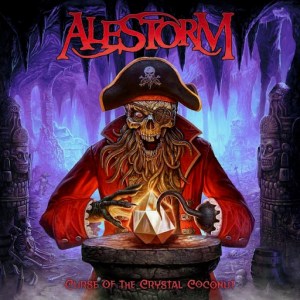
It’s taken a long time to get to this point, where I’m actually reviewing a new Alestorm record. I’ve had a bit of a change of heart about this most ridiculous of bands, a perspective shift if you will, in large part due to talking to people who are fans of them and I suppose not taking myself so seriously either. Honestly Curse Of The Crystal Coconut was a breath of fresh air when I first heard it the other week, and these days anything that puts a smile on one’s face is greatly appreciated. I have no frame of reference in saying the following (given that I haven’t paid attention to Alestorm’s past few records apart from their debut), but some of these lyrics seem to be dripping with poison, aimed squarely at the band’s own fanbase. I’m thinking specifically of “Shit Boat (No Fans)” and “Pirate Metal Drinking Crew”, and they’re funny —- but yeah, I get the feeling that Chris Bowes might be a little over the band’s association with pirate imagery. Case in point is the lead off track and album highlight “Treasure Chest Party Quest”, where lyrics like “We’re only here to have fun, get drunk / And make loads of money / Cause nothing else matters to me” sort of say it all really. And here’s the thing, and this will sound judgemental, but I’ve see Alestorm live many times, I’ve seen their fanbase —- and truthfully, they kind of annoy me too. I get it. Moving on however, I will commend the level of musicianship here, there’s folk instrumentation aplenty, all very easy on the ears. There’s a rather astonishingly bold power metal moment on “Call Of The Waves”, with a truimphant chorus that surprised me by how stirring it is, so much so that I placed it on the Anti-Anxiety Power Metal Playlist. I’ll recommend this for a lighthearted goof if you need it, and I’m betting lately we all do.
Myrath – Live In Carthage:

Myrath had a tough break when the whole pandemic situation hit, caught in the midst of a tour and thus getting stuck in the country they were in when travel restrictions started being enacted all over Europe. I’m not clear on the details, except to note that the band members have only just begun to make it home over the past couple weeks here (its now early June). In the midst of this, the digital release for their Live In Carthage live record/film came out and I was listening to this pretty intensely in early April. I don’t normally review live albums, as I don’t tend to listen to most of them anymore, but I found myself making an exception for Myrath, not only because I was curious about live renditions of some of my favorite songs of theirs being present here —- but also because Myrath’s sound was part of the tonic I needed to stave off negativity and anxiety that I was experiencing at that time. So much of their sound is built on major keys, be it in Zaher Zorgati’s often euphoric vocal melodies, that veer from that gorgeous Arabic phrasing that I love, to ultra emotive hard rock/power metal informed delivery heard on gems like “Sour Sigh” and “Wide Shut”. And I dunno, just like Orphaned Land, Myrath infusions of pan-Arabic music into their particular blend of prog metal and hard rock just speak to me, it takes me out of my environment and plugs me into modern day locales near the Meditteranean —- the clash of old and new that seems to characterize the cityscapes of Tunis, Cairo, Jaffa, and countless other places. Where I live in Houston, a relatively young city, we mark the passage of time seemingly by the development of new shopping centers, strip malls, and fast food places. Point is, it’s music that seems to connect me to an older, far more dramatic old meets new merging, an escape, but one that’s firmly locked in our real world. As for this live recording, as expected it’s cleanly recorded and mixed, a little too clean for some perhaps, but I enjoy the balance of soundboard recording and crowd mic-ing that the band was striving for in the mix. During the last chorus of “Storm Of Lies”, Zorgati backs off to let the Tunisian audience carry it on their own, and they loudly bellow “…don’t let me goooo!”, creating a transcendent moment for a song that is a plea for connection and not being alone.
Darktribe – Voici L’Homme:

So some of you might remember that I talked about this album on the MSRcast back in January when we were beginning to talk about the early 2020 releases. This is Darktribe’s third album, and it arrived on January 17th, and while I listened to it quite a bit around its release, it kind of slipped from my rotation and the next few crazy months happened. So around a week ago I was going through all the 2020 releases I’d listened to so far and this album grabbed my attention again, and I’ve realized that I never wrote about it here, and honestly I haven’t heard a lot of people (even in power metal circles) talking about it and that’s unfortunate. Darktribe hail from France, an unusual spot for a prog-power metal band whose sound is akin to Kamelot. But despite their music sharing the major keystones of that band —- a four-piece band with one guitarist/one bassist that employs a focused, economical, thick riffs in the front with vocal melody driven songs approach, Darktribe choose to liven up their sound with an ample splash of Euro-power. You hear that subtle addition in tracks like the album highlight “Back In Light” and the title track. The former is smooth and understated, with vocalist Anthony Agnello’s rich, smooth tenor delivering a slyly catchy chorus via some effortless melodic phrasing and never really launching his vocals skyward until just before guitarist Loïc Manuello’s joyful solo built on an articulately phrased progression and a wild bit of furious Kai Hansen-ing to punctuate it’s tailing off. On the latter, Manuello cleverly mirrors Agnello’s vocal melody about a half beat behind, creating a reinforcing of that melody that elevates that chorus even more than Agnello’s captivating delivery of lyrics in French manage alone. His employing his native tongue is a nice touch, because he sounds so extra confident in delivering it, not to say that his English is flawed (anything but). DarkTribe have a biblical/religious conceptual and lyrical theme running through their work much in the same way that Theocracy does. Don’t let that be a stumbling block, this is one of the most artistically significant releases of the year, and it’d be a shame if it got forgotten because of it’s unfortunate release date.
Boisson Divine – La Halha:

There’s always a record that comes out of nowhere every year, increasingly from band’s I’ve never heard of before, that manages to sweep me away before I knew what hit me. This year, it’s the summer’s most euphoric, life affirming release from a folk-metal quintet from the Gascon region of France with an odd name and a truly unique take on the genre. Boisson Divine don’t do folk metal like we’re used to, with dark overtones and often folded into an extreme metal patchwork ala Eluveitie, Manegarm, and many others. Their approach to the style is a bouncy, bright, almost celebratory take on traditional Gascony folk traditions married to meat and potatoes heavy metal with splashes of power metal’s neoclassical tendencies here and there. The closest comparison to come to mind would be if Flogging Molly were from Gascon, and played metal not punk —- and to lean into the folk metal genre a bit, at times I’m reminded of the playful stuff that Otyg did on their two albums way back in the day (ie, more folk than metal but still hard-hitting stuff). The mood here is noticeably, I dunno how to explain it… laid-back is not right, but I guess to say these songs are without anger is closer to the truth. As the band explains on their Bandcamp bio, their lyrics can be about historical figures, heritage, and legends, but also about everyday things like rugby and feasts. They emphasize the latter as much on the music video for “Liberat”, as soulful and unforgettable a single you’ll hear all year. The band hikes through what I’m assuming is their native countryside, pitches up a campfire, and gets to eating, drinking, and playing —- and that’s kind of the vibe I’m hearing throughout this record, that of enjoying and savoring simple, fine things in a pure way. It’s strangely the sentiment that we all could use right now, when everything about life seems extraordinarily complex, and we’re all too stuck inside our own heads, being isolated from friends and fun. I needed this record.

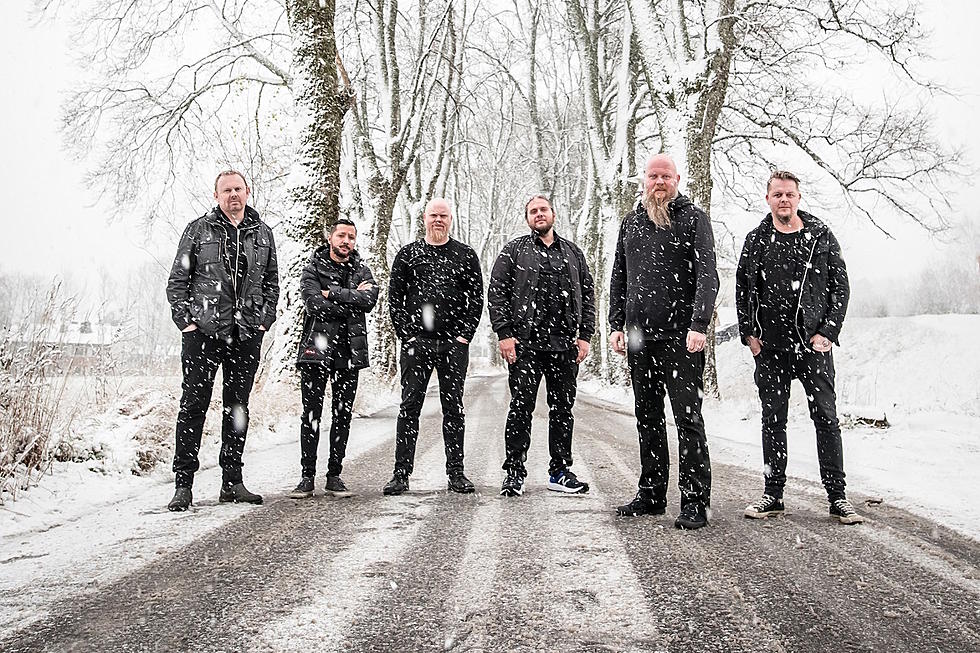




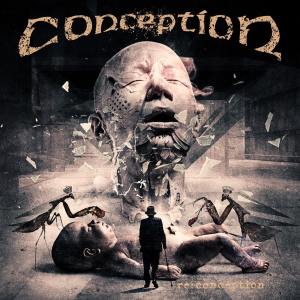
 The bounty of spring indeed, because this month I’ve found myself going through at least eight new releases, a few of which aren’t listed in the reviews below but might be up later sometime. Some of these are also late February releases that I had overlooked that month or simply thought were coming out in March (or more accurately, I didn’t get around to listening to until recently). There’s a lot to get to and I’ve tried to keep things short and concise for you and me both, so we’ll apply that to this preamble too. Begin!
The bounty of spring indeed, because this month I’ve found myself going through at least eight new releases, a few of which aren’t listed in the reviews below but might be up later sometime. Some of these are also late February releases that I had overlooked that month or simply thought were coming out in March (or more accurately, I didn’t get around to listening to until recently). There’s a lot to get to and I’ve tried to keep things short and concise for you and me both, so we’ll apply that to this preamble too. Begin!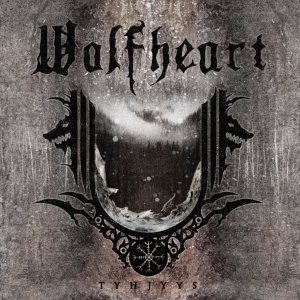 Wolfheart – Tyhjyys:
Wolfheart – Tyhjyys: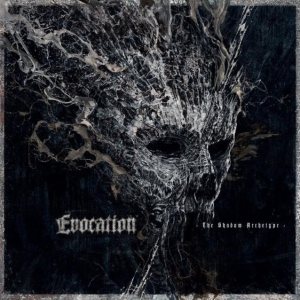 Evocation – The Shadow Archetype:
Evocation – The Shadow Archetype: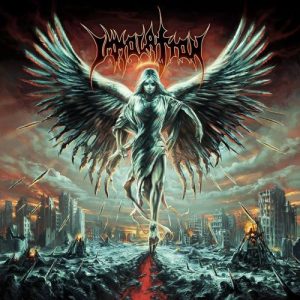 Immolation – Atonement:
Immolation – Atonement: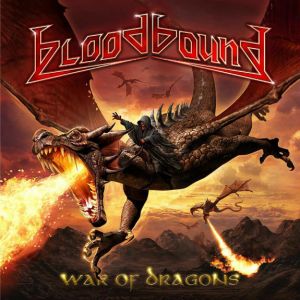 Bloodbound – War of Dragons:
Bloodbound – War of Dragons: Mors Principium Est – Embers of a Dying World:
Mors Principium Est – Embers of a Dying World: